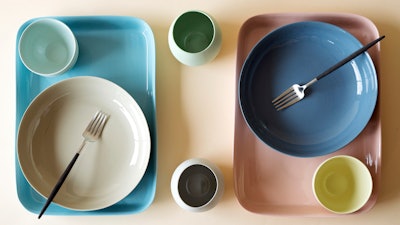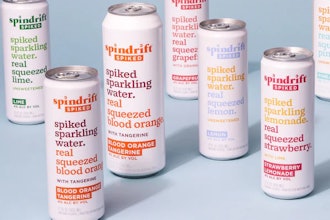
The way a dish looks has been important to the dining experience since forever, but perhaps never more than now. Relaxed and homey. Or vibrant and celebratory. And perhaps shareable, too.
"Chefs know that guests spend a lot of time looking at their plates," says Chandra Ram, associate editorial director of Food & Wine magazine.
"So it's another detail, before you eat, to help set the stage for a visual experience. This is especially true for dishes they know are going to make it onto Instagram — a beautiful plate makes for a better (and more shareable) image, which helps market the restaurant."
As with restaurants, so with the home.
Design is all over new tableware. The classic white ceramic circle has ceded some ground to plates in a variety of creative shapes and colors.
PERFECT IMPERFECTION
"Chefs and restaurants are moving away from traditional ways of food presentation," says Thomas Kastl, director of dining at Ambiente, the global homewares trade fair in Frankfurt each year. "The latest trend embraces handmade-style tableware, or irregular shapes inspired by nature, like leaves or shells."
Stoneware, in particular, is enjoying a renaissance, he says. It's natural, recyclable and long-lasting, and "implies down-to-earthiness, legacy and craftsmanship."
The stoneware trend also reflects a "more relaxed plating style," even in fine-dining restaurants, Kastl said.
It's part of a larger shift in decor, says Blair Donovan, an editor at Apartment Therapy.
"The past few years have been all about soft, fluid furniture; now I'm noticing these silhouettes trickle over to dinnerware," "Instead of conventionally clean-edged plates and platters, more organically shaped, asymmetric styles are cropping up."
A LITTLE WONKINESS
Donovan mentions brands like Food52 and Soho Home for having embraced "imperfect" dining sets, often in neutral, earthy tones.
At Crate & Barrel, designer Leanne Ford's Kiln wonky dinnerware looks fresh off the potter's wheel. The retailer also sells the Julo stoneware collection from Portugal, with blue and brown reactive glazes creating kinetic patterns.
Scallop trim – a trend noted in Apartment Therapy's 2024 State of Home Design survey – has found its way from decor to plates, where the wavy edging is especially well-suited to smaller appetizer and dessert dishes.
Ceramicist Jono Pandolfi started making dinnerware for restaurants in 2004. When Michelin-starred restaurateurs like Danny Meyer began working with him, the business really took off. Today he's in a 6,000-square-foot production house in Union City, New Jersey, where 10 kilns are kept busy making stoneware for home cooks and gourmet restaurants around the country.
And on New York's Lower East Side, the recently opened Bar Miller restaurant serves its omakase menu on the colorfully glazed ceramic slabs and plate bowls of local artisans Helen Levi and FeFo Studio.
A CANVAS FOR SELF-EXPRESSION
"Chefs are telling me they use beautifully patterned plates to help tell their stories," says Ram, of Food & Wine. "A vintage plate style might reiterate that a chef was influenced by a parent or grandparent's cooking."
Some playful patterns put the design on just one side of the plate. Others evoke nature, like Fortessa's swirling Cloud Terre and Northern Lights collections.
Still others favor modern art. In Olhao, Portugal, David Pimentel and Arren Williams created Casa Cubista, named for the town's Cubist-style buildings. The buzzy brand has handmade plates with bold swaths of glaze, colored dips and graphic abstracts.
Mud Australia has matte-finish ceramic pieces in soft, dreamy hues with names like pistachio, duck egg, mist and blossom.
DOES COLOR MATTER?
At London's Kitchen Theory food design lab, chef Jozef Youssef and his team have done surveys of how the color of a dish affects a diner's perception of the plated food.
Their findings: Dishes served on red plates were thought to be sweeter, making them ideal for desserts. Yellow plates seemed to make fruit dishes look especially appetizing. Blue and green? These plates were said to make dishes appear healthier.






















